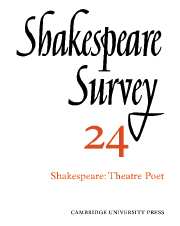Book contents
- Frontmatter
- Hearing Shakespeare: Sound and Meaning in ‘Antony and Cleopatra’
- ‘More Pregnantly Than Words’: Some Uses and Limitations of Visual Symbolism
- Shakespeare and the Limits of Language
- Revenge, Retribution, and Reconciliation
- Shakespeare the Professional
- Shakespeare’s Talking Animals
- The Morality of ‘Love’s Labour’s Lost’
- Shakespeare’s ‘Earth-treading Stars’: the Image of the Masque in ‘Romeo and Juliet’
- ‘Hamlet’ and the ‘Sparing Discoverie’
- ‘Hamlet’ in France 200 Years Ago
- The Hamlet in Henry Adams
- ‘Pericles’ and the Dream of Immortality
- A Necessary Theatre: The Royal Shakespeare Season 1970 Reviewed
- Free Shakespeare
- The Year's Contributions to Shakespearian Study 1 Critical Studies
- 2 Shakespeare’s Life, Times, and Stage
- 3 Textual Studies
- Index
- Plate section
‘Pericles’ and the Dream of Immortality
Published online by Cambridge University Press: 28 March 2007
- Frontmatter
- Hearing Shakespeare: Sound and Meaning in ‘Antony and Cleopatra’
- ‘More Pregnantly Than Words’: Some Uses and Limitations of Visual Symbolism
- Shakespeare and the Limits of Language
- Revenge, Retribution, and Reconciliation
- Shakespeare the Professional
- Shakespeare’s Talking Animals
- The Morality of ‘Love’s Labour’s Lost’
- Shakespeare’s ‘Earth-treading Stars’: the Image of the Masque in ‘Romeo and Juliet’
- ‘Hamlet’ and the ‘Sparing Discoverie’
- ‘Hamlet’ in France 200 Years Ago
- The Hamlet in Henry Adams
- ‘Pericles’ and the Dream of Immortality
- A Necessary Theatre: The Royal Shakespeare Season 1970 Reviewed
- Free Shakespeare
- The Year's Contributions to Shakespearian Study 1 Critical Studies
- 2 Shakespeare’s Life, Times, and Stage
- 3 Textual Studies
- Index
- Plate section
Summary
Criticism of Shakespeare’s Pericles has most often concerned itself with those of the play’s problems that might offer a solution to patient inquiry. If the results have been disappointing, they have been intelligibly so; and yet, were the evidence less fragmentary and indecisive, and we could reach confident conclusions about authorship, literary genesis, and the skills and frailties of compositors A and B, the essential mystery of the play might still elude us, for it has to do with the insights and devices by which art attempts to encompass human mortality. If we wonder why the plays of Shakespeare’s time, flourishing as they do upon a medieval root, offer so little reassurance about personal survival in a life to come, we may reflect with Wittgenstein that, ‘Death is not an event of life. Death is not lived through’. The plays are pre-eminently about what is lived through.
- Type
- Chapter
- Information
- Shakespeare Survey , pp. 105 - 116Publisher: Cambridge University PressPrint publication year: 1971

